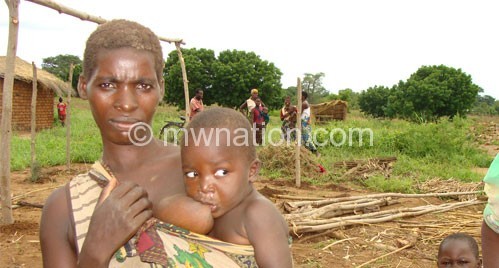Community sanitation to end stunting
Christina Chanza used to breastfeed her baby regularly. The 30-year-old woman living in Sabuni Village, Traditional Authority (T/A) Nkalo, in Chiradzulu says she did everything to safeguard the two-year-old from stunting, illnesses and weight loss.
“It was surprising the baby looked sickly and malnourished despite having a diet comprising all six food groups,” she says.
The mother remembers diarrhoea and dysentery—which catalyse stunting among children aged below five years—frequently haunted the baby.
“We didn’t know the cause. We thought someone was bewitching her,” she recalls.
Now she knows why her baby was stunting as is the case with nearly half of under-five children in the country.
The major setback to her impassioned struggle to guarantee the child’s well-being was poor access to safe water, sanitation and hygiene in her home and surrounding households.

Now the one-time unsanitary homestead, where people were defaecating in the open, has a hygienic latrine, hand-washing facility, rack for utensils and other sanitation installations.
“We were living dangerously,” she says. “We did not know that simple things like washing hands with soap after visiting the nearby toilet could save precious lives,” says Chanza.
She is just one of the rural breastfeeding women who are waking up to the importance of sanitation and hygiene to stop the spread of preventable infections that stunt children.
Currently, they clean hands before they start breastfeeding their children and prepare food. They also do as much after changing baby nappies.
The villagers resolved to break a culture of uncleanness following an encounter with Development Aid from People to People (Dapp) change agents who are working in collaboration with Chiradzulu District Council to promote nutrition and reduce stunting among under-fives.
The State-funded intervention has stimulated the locals to appreciate the importance of sanitation and hygiene to lessen the burden of diarrhoeal diseases which impairs children growth.
Emily Magalasi, 60, sold three bags of pigeon peas to raise money for constructing a toilet, a kitchen and a refuse pit.
“She thanks Dapp facilitators, health officials and community health promoters for awareness meetings targeting households with children aged under five,” she says.
The race against stunting and malnutrition targets children in their first 1 000 days, a period when they experience rapid growth and development.
Sadly, the recent Malawi Demographic and Health Survey (MDHS) shows that 45 in 100 children in the country are stunted.
Surveys attribute the “silent crisis” to frequent illness as well as poor breastfeeding and uptake of nutritious foods.
The risk factors were rampant in Sabuni where the majority of villagers were defaecating in nearby bushes.
The villagers remember children being repeatedly taken ill by diarrhoea, which causes up to nine percent of childhood deaths.
The disease is also a major cause of stunting in the first 1 000 days of a child’s life.
Stunting at this crucial stage is associated with permanent, irreversible damaging impacts on the child’s physical and intellectual development.
Dapp uses care groups, comprising eight to 11 target couples, to reach out to beneficiaries with timely updates as well as vital health messages and services.
Dapp project manager John Sande says awareness levels will continue to rise until no child’s chances in life are endangered by stunting and preventable illnesses.
“We envisage that promotion of nutrition interventions should not be done at the expense of hygiene,” he says.
Apart from illness caused by poor hygiene, stunting is caused by mother’s under-nutrition during pregnancy, hasty introduction of breastfeeding babies to complementary food and delays to initiate them to recommended nutritious foods.
Stunting adversely effects brain development and affected children perform poorly in school. They are also associated with high repetition rates and drop-out rates.
“As a project, we are particularly delighted to note that through lead parents, mothers are now aware of the importance of living in a clean environment for the good health of their babies and themselves,” says Sande.
Village Head Sabuni calls Dapp’s intervention “a real eye-opener”.
Previously, many households had no latrines and refuse pits. Now, we are a changed community. We wash hands with soap to avoid diarrhoea and other diseases,” he says.
The nutrition and sanitation project, which is being implemented throughout the district, thrives on trained front line workers who promote adoption of hygiene practices from personal to domestic level. n





